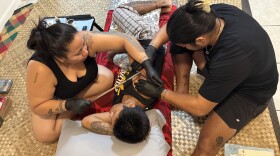In June, Hawaiʻi will host the 13th Festival of Pacific Arts and Culture, which will draw more than 2,200 delegates from at least 28 Pacific countries and U.S. territories.
It's the largest celebration of Indigenous Pacific Islanders, starting over half a century ago after a group of elders from the South Pacific raised concerns about the erosion of traditional practices.
The first festival in 1972 — once called the South Pacific Festival — was held in Suva, Fiji. Now the festival is known as FestPAC and is held every four years, rotating among islands in Polynesia, Micronesia and Melanesia.

Festival Director Aaron Salā, who is Hawaiian and Samoan, said the festival honors traditional culture and elders while cultivating relationships with "our genealogies across the Pacific."
"It is a Pacific hosting in a Pacific way," he said. "The goal of which is to bring people from across this ocean together to celebrate ourselves and each other, and the unique identities that make up the Pacific region."
The 10-day event is set for June 6 on Oʻahu after four years of delay due to the COVID-19 pandemic. Guam was the last to host the festival in 2016.
Hawaiʻi's FestPAC planners say they're in the final stretch of planning the Pacific celebration, which usually attracts more than 100,000 visitors and locals.
Pacific countries and U.S. territories attending the festival are American Samoa, Australia, Cook Islands, Easter Island (Rapa Nui), The Federated States of Micronesia, Fiji, French Polynesia, Guam, Kiribati, Republic of the Marshall Islands, Nauru, New Caledonia, New Zealand, Niue, Norfolk Island, the Commonwealth of the Northern Mariana Islands, Palau, Papua New Guinea, Pitcairn Island, Samoa, Solomon Islands, Tokelau, Tonga, Tuvalu, Vanuatu, Taiwan, and Wallis and Futuna.
A commission planning FestPAC in Hawaiʻi allows 100 delegates per island nation and territory. Cultural practitioners and artists from across the Pacific will showcase dance, poetry, carving, tattooing and other traditional practices.
"It's kind of like the Olympics of culture," said Kalani Ka'anā'anā, who chairs the commission.
Ka'anā'anā said the festival has a $20 million budget, adding that they've received private donations and fundraising. He also said the federal government granted $750,000 to help delegates attain their visas.
It's the first time the event will be held in a U.S. state that has stringent visa requirements, according to Ka'anā'anā, noting that some delegates started their visa interviews last week.

"We don't know if all delegations will be able to max out each of their delegations," he said. "So we're prepared for them, but we're not sure."
He said delegates would pay for their way to Hawaiʻi, but the state would accommodate their housing at the University of Hawaiʻi dorms and provide bus transportation and meals.
The main hub of the FestPAC will be located at the Hawaiʻi Convention Center's exhibition hall. But other venues hosting festivities include Capitol Modern and the Bishop Museum.
"We have several venues throughout Honolulu that take us outdoors and take us out into the community, which is the point of the festival," Salā said. "We're going out to UH West Oʻahu, the largest population of Native Hawaiians on that side. We're going to Windward Mall, the community on that side, as well as Native Hawaiian. Kalihi Palama Settlement has a large diaspora Pacific Islander community."
Salā said the state Legislature provided $5 million for the festival, and another $5 million came from the governor's discretionary fund. He said the state has almost closed the gap to raise enough funds for the festival.
Last week, the Office of Hawaiian Affairs approved $1.5 million to fund FestPAC. The money will go toward opening and closing ceremonies, an ecumenical service, a Pacific traditional leaders forum, and other event programming during the festival.
The festival has been described as the Asia-Pacific Economic Cooperation meets the Merrie Monarch hula competition.
Although the festival is primarily focused on the Pacific Islands' arts and culture, Salā said there will be discussions on how islands are tackling the impacts of climate change, tourism, geopolitics and other pressing issues facing the Pacific.
"At the end of the day, this festival is meant to celebrate the people who make up the region, and meant to bring these people together in a way that elevates what we have been doing for generations and generations and generations, and reminding ourselves that we aren't alone in this ocean," Salā said.
He quoted the late Tongan scholar Epeli Hauʻofa, "The smallness of our islands should not define us but by the greatness of our oceans."
As HPR's Cassie Ordonio reports in <i>part two of this story</i>, some Pacific Islanders in the diaspora will get to witness the largest celebration of themselves for the first time.







